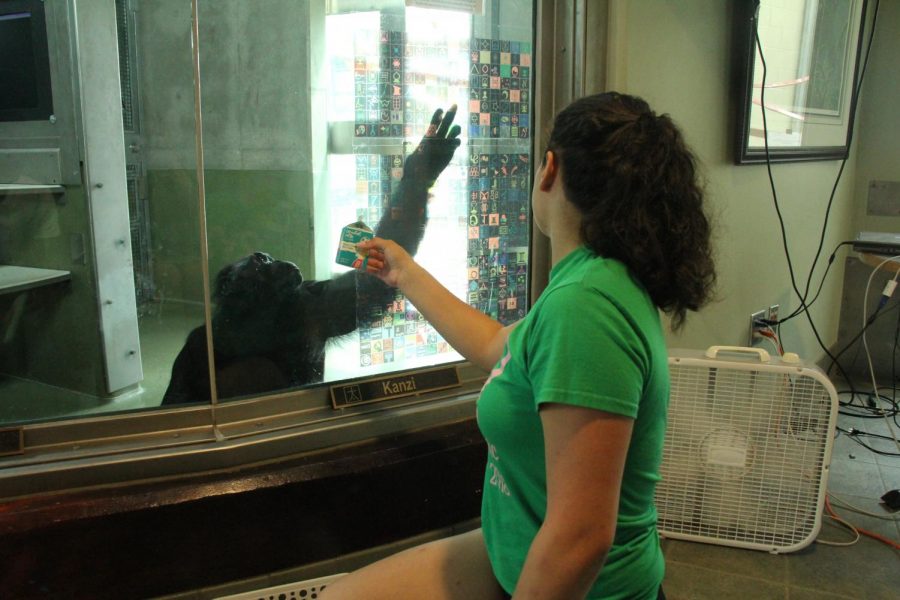Ape Initiative: an unknown asset to Des Moines is pretty relative; support it
The difference between bonobo apes and humans is 1.4 percent of DNA
August 9, 2018
If you brush your teeth, give out kisses, watch movies or sleep with a blanket then you are a Bonobo Ape. Well, sort of. The only thing separating you and an ape is a 1.4 percent difference in DNA. And if you have ever seen one, both the behavior and appearance between the two species is uncanny.
Whether you have lived in Central Iowa for five or 15 years, I can almost guarantee you have not heard about the Ape Cognition and Conservation Initiative (ACCI). If you haven’t heard about it, then you have no idea what you’re missing out on.
Located in southeast Des Moines at 4200 Evergreen Ave., ACCI is a sanctuary for Bonobo apes, though it is nothing like a zoo. ACCI is not open to the public, which contributes to the unawareness Des Moines citizens have. Keeping it closed to the public helps keep the sanctuary research-based and not centered around entertainment, like a zoo does.
“If we had people to care for, we wouldn’t have much time to care for our animals,” Amanda Epping, research coordinator at ACCI, said.
Private tours are provided upon a request basis from schools, groups and organizations though.
For being around for 14 years, it is becoming a problem that if asked, most of Des Moines would have no idea about ACCI or its daily cognitive, social and behavioral research work and care for five bonobos – Kanzi, Nyota, Teco, Maisha and Elikya. Or, that researchers from around the globe choose ACCI to do research concerning communication and how similar these apes are to humans.
Some parts of the community such as Hy-Vee and AE Dairy have been involved by donating fruits and vegetables, and yogurt, which are used to feed the apes. Apes have to consume between 1,400 and 2,000 calories per day, and Epping said that’s a lot of hourly feedings when most of their diet is fruits and vegetables.
Community involvement and acceptance could make a big difference in not only the lives of the bonobos, but the staff that dedicates their time to them too. Even small donations will help them with the bonobos and their 230 acres of land.
Kanzi, one of their most well-known bonobos, is 37 years old and knows between 3,000-5,000 words in the English language that he associates with symbols laid out on a lexigram keyboard. In the past, he has used a barter system to get more bananas and loves to be tickled.
Teco, its youngest ape at eight years old, is very playful. He loves celery and swinging on ropes. He also likes watermelon toothpaste and watching Disney movies.
Does this sound like the kind of apes you would see in a movie like Planet of the Apes? What if you knew that Kanzi is afraid of storms? Would this make you want to be more involved with ACCI?
All the Bonobo apes have likes and dislikes, favorite foods and activities. Each ape has a unique personality and attitude. They are an endangered species that will continue to be endangered, but with ACCI, Des Moines will continue to grow its bonobo ape population, and world-wide researchers will continue to seek out time there, studying communication and how similar these bonobos are to humans.
It has made great strides in researching and protecting bonobo apes since its creation in 2013, and with its approaching accreditation from the Association of Zoos and Aquariums in the near future, it will only continue to grow by perhaps getting more bonobos and in a year or more time, having babies born there. These are their long term goals, and they are making strides now.
As a community, Des Moines can come together and help ACCI not just because it’s the only one of its kind in North America or because the small staff truly cares about the bonobos, but because you’re not so much different.
After all, only 1.4 percent of DNA separates you from them.
All donations go to the care of the bonobos. To donate, please visit its website at www.apeinitiative.org.



